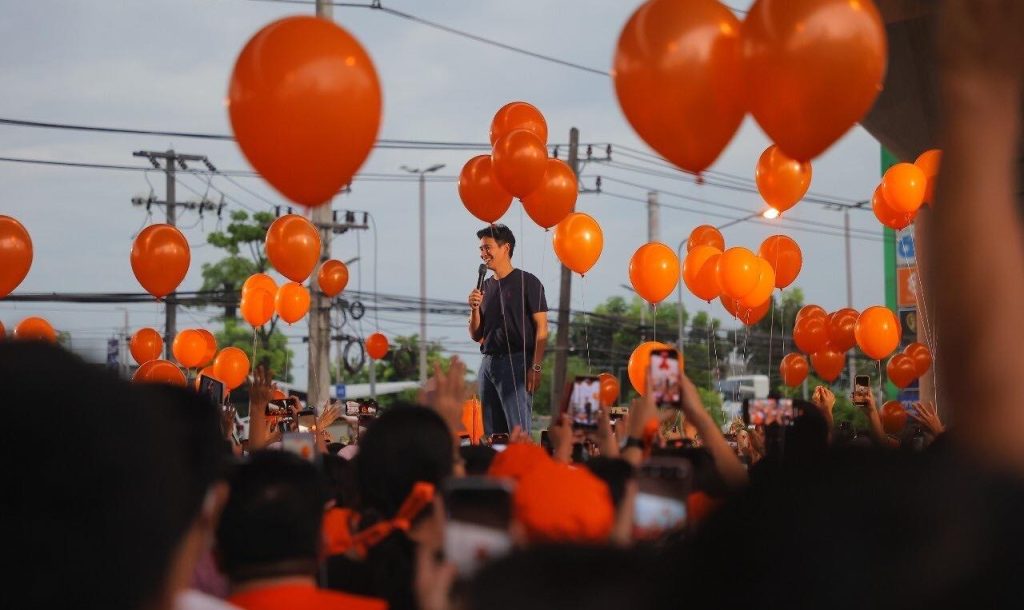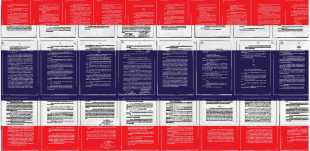The general election in Thailand on 14th May was a spectacular event. After years of receding democracy, Thailand finally saw a glimpse of hope showing that Thais could choose for the better. The electoral outcome was decisive, with more than 75% voter turnout. The overwhelming majority of them — about 25 million voters — voted for the Move Forward and Pheu Thai parties, who identified themselves as anti-coup and pro-democracy.
This result was even more remarkable when compared to the poor performance of four former government parties, who altogether won only 172 MPs in the 500-member lower house of parliament. The most unexpected result is that Move Forward, a young party, outperformed the more established Pheu Thai, winning 151 seats to Pheu Thai’s 141. In sum, this election could be described as not merely a vote on government but also a vote on a type of regime. Thais rejected the hybrid regime of semi-democracy controlled by the military and opted for fuller democracy.
Unfortunately, things rarely go in a straightforward manner here. A decisive electoral outcome should have meant a quick and smooth negotiation to form a government. Three months on, no new government has been formed. Every day brings a new twist more bizarre than the day before’s. Negotiations over the appointment of a new prime minister are continuing but show worrying signs of a possible collapse. Thailand is again teetering on the verge of another constitutional crisis. There are signs that all mechanisms are working in tandem to subvert the people’s will. If a coup is defined as an unconstitutional means to seize the power to govern, then Thailand is witnessing a slow and meticulous coup, though without the explicit presence of the military.
Typically, a Thai coup needs a few elements. There must be a critical mass of anti-democratic protesters to create a false sense of lawlessness. A few political parties rejected a parliamentary process before watchdog agencies and courts axe the government leaders. An ensuing deadlock justifies the military’s seizure of power. This was the formula in 2006 and 2014, but things are different in 2023 as the anti-democratic mass movement has been reduced to a pitiful size. The army has lost the required legitimacy to step in.
Yet the conveniently-designed 2017 constitution offers an alternative method of subverting the results of an election, by enshrining a role for the military-appointed Senate in appointing a prime minister jointly with the elected House of Representatives; because of this, any PM hopeful must secure at least 376 votes of the Parliament instead of usual 251 seats of the House of Representatives, as well as be subject to an unrealistically rigorous vetting process. The constitution provides no check or control over watchdog agencies and the judiciary.
Beyond the constitutional design, conservative elites have been able to exploit a division between Move Forward and Pheu Thai. The former prides itself on being a maverick. Despite its chaotic organisation and ragtag budget, Move Forward drew public attention from their bold policy campaigns aiming at reforms of the monarchy, military, and business conglomerates. Mover Forward is therefore considered radical and a potential threat to the status quo. Pheu Thai, as a successor to the famous Thai Rak Thai controlled by Thaksin Shinawatra, has claimed the status of a sole representative of the democratic camp in Thailand for over a decade.
However, the rise of Move Forward spawned a sense of rivalry since the two parties compete for a similar target group. Pheu Thai’s affiliation with Thaksin is a blessing and a curse. Thaksin holds a mixed record while in office. The economy boomed and the nation prospered under his administration, at the price of human rights abuses and corruption. His strong policy performance generated a loyal supporter base, but his tainted legacy prevented many democratic voters from voting for Pheu Thai in 2023. Naturally, they choose Move Forward.
Thaksin’s self-exile provides the conservatives an important bargaining chip. He faces a pending 10-year prison term. To achieve its goal of bringing Thaksin back to Thailand, Pheu Thai needs to appease the powers that be. Their policy would never be as bold and confrontational as Move Forward’s. Thus, there are always rumours about Pheu Thai cutting a deal with the military to guarantee Thaksin’s safe return.
Those rumours have made Pheu Thai an unreliable partner to Move Forward. Their time together as an opposition from 2019 to 2023 proves that difference between the two is irreconcilable. Pheu Thai repeatedly avoided discussing any of Move Forward’s agenda deemed that was too provocative, and even voted in favour of the pro-military government.
One key topic in the 2023 election was the monarchy, which has lately become the symbol of many political ills, including extra-constitutional political interventions and human rights violations, sparking the call for monarchical reform in the 2020–2021 protests. The police brutally cracked down on those protests and the Constitutional Court ruled that the protesters’ demands were unconstitutional.
However, the pro-reform sentiment persists. While most political parties prefer to remain silent, Move Forward openly advocated for an amendment to Section 112 of the Criminal Code—the lese majeste offence—to prevent its abuse as a political weapon. A resounding electoral victory indicates that a significant portion of the public concurs with Move Forward’s proposal, something which offends the royalist camp, who suspect the proposal as the beginning of a secret plan to turn Thailand into a republic. Both the senate and the previous government parties confirmed that they would not cooperate with Move Forward because of lese majeste concern. Even Pheu Thai insisted that lese majeste shall not be included in the coalition’s now-defunct Memorandum of Understanding.
For its part Pheu Thai has been far from a good team player. While it was entwined in a deal to nominate Move Forward’s Pita Limjaroenrat as prime minister, it erratically kept stepping up its demands. Although Move Forward wins the most seats, Pheu Thai illogically demanded that Move Forward must be generous in allocating a cabinet quota and giving away the role of the House Speaker to Pheu Thai. Move Forward was fully aware that Pita was going to face stiff resistance from the conservatives, so it might take several rounds of voting before the parliament would accept Pita’s PM bid. The speaker would play a critical role in providing that chance of continuous voting. Unfortunately, Pheu Thai skilfully installed Wan Muhamad Noor Matha, a veteran Muslim politician from the Deep South, who claimed to be professional and neutral.
Eventually, the parliament rejected Pita’s first bid for PM. When Move Forward motioned for a second round of voting, their worst fears came true. Here, despite his claim of experience and neutrality, Wan let the parliament erroneously interpret the meeting procedure to reject the motion, reasoning that they could not vote on the same motion twice in the same parliamentary term. The incident added animosity between the two parties, especially after Move Forward had to concede defeat and let Pheu Thai take turn to lead the coalition. Pheu Thai wasted no time in contacting all the former junta parties, but the condition remained that the new coalition must not have the “disloyal” Move Forward. Even coalition members began to voice their opinion that Move Forward was too radical and should have dropped their lese majeste policy.
Move Forward’s landslide victory confirms that the society perceives lese majeste as a priority. But a synchronised move in the parliament is an attempt to thwart and tame that desire: in the conservatives’ view Move Forward must be expelled—or better, removed from the game.
A year after referendum, only bad news about Thailand’s constitution
The new constitution leaves booby traps for any incoming civilian government.
Currently, the issue of the parliament’s second vote on Pita’s prime ministerial appointment is under investigation by the Ombudsman, who has referred the case to the Constitutional Court. Speaker Wan then suspended the third round of voting indefinitely waiting for the Constitutional Court’s rule on the case. Like a previous coup, this move provided a false sense of deadlock, which has justified politicians’ overriding the election result.
A cynical reading of Thai politics should raise doubt whether these parties, courts, and other agencies, are really concerned with the survival of the monarchy. In addition to the penal code offence of lese majeste, Move Forward has proposed, among other things, the end to a mandatory conscription, a review of energy policy, better education, stronger labour rights, a new approach to the Muslim insurgency in the Deep South, all of which would infringe upon the status quo of the military, big business, and bureaucracy. Lese majeste is perhaps simply a convenient and irresponsible excuse to cover up all political, social, and economic ills. Even if Move Forward had dropped their lese majeste policy, none of the conservative political actors would have backed them to take power.
In many countries it is possible that parties participate in a protracted negotiation that could take months or even years to reach an agreement. Sometimes, it happens that the largest party fails to form a government and a minority administration is formed in its stead.
But the synchronised political rejection and legal investigations against Move Forward suggests that the Thai case is not natural. These are parts of a larger plot. This suspicion has just been confirmed when Thaksin announced that he was coming home on 10 August. In all likelihood after serving a brief time in prison, he would request a royal pardon. Pheu Thai would be likely to abandon its anti-coup rhetoric and lead a coalition with former junta parties. Move Forward would be an outcast to be finished off by the Constitutional Court. This could be the basis of a mega deal whereby the royalists settle the fight against Thaksin.
A Pheu Thai-led government, meanwhile, would be expected to restore Thailand’s sluggish economy. The return of the former prime minister should appeal to millions of his supporters not to join the youth movement protesting against conservative–royalist control over Thai politics. The success of such a plan relies on an assumption that first Pheu Thai is able to revive the economy, and second that the majority of Thais could be satisfied by material wellbeing so they will not take the party’s betrayal too seriously.
A coup de grace for the hope that emerged from Thailand’s 2023 election was Pheu Thai’s announcement on 2 August that it needed to part with Move Forward because the latter refused to withdraw its policy on lese majeste. All the former junta parties reacted positively by expressing their willingness to join the next government. Pheu Thai insisted that this was the act of martyrdom, sacrificing themselves to rescue the sinking country, at the cost of their own credibility. But voters were furious, connecting all the dots and realising the plan to subvert the election.
At best, the formation of a Pheu Thai-led coalition will be a pyrrhic victory. Pheu Thai will no longer be able to claim to be pro-democracy. The party will become a puppet for the elite, a substitute for the army to control the mass. Their manoeuvre vindicates the criticism of anti-Thaksin Yellowshirt protesters, that Thai was short-sighted, self-interested, and corrupt. Thaksin, in particular, is selfish and reckless, who regards people as only instrumental to gaining power. Ideology is not important and parties could backtrack their promise regardless of their supporters’ demand. This will further erode trust in democracy.
The emergent Pheu Thai–conservative deal leaves a bitter taste in everyone’s mouth: the youth who have spent years fighting for meaningful elections; asylum seekers and political prisoners; those injured and dead fighting against (and for) Thaksin; and the anti-Thaksin royalists as well. The likelihood of a Pheu Thai-led government forecloses a chance to amend lese majeste laws, release political prisoners, or initiate a justice process over the army’s violations of human rights.
The ultimate question remains: what fate would await Pheu Thai after the conservatives successfully deal with the radical Move Forward and their youth followers? Despite this clever deal to divert the outcome of the 2023 election, the road to power for Pheu Thai is not smooth. Without support from Move Forward, the new coalition has little leverage against the conservative elites. Pheu Thai’s prime ministeral candidate, real estate tycoon Sretha Taweesin, is now subject to daily attacks similar to that of Pita. These scandals could potentially render him unfit for the job. Sretha might be sidelined by Prawit Wongsuwan, the former deputy prime minister for Prayuth Chan-ocha and a senior figure junta figure. Wan has not set the date for another prime ministerial vote and the Senate has offered to support Pheu Thai. All of these developments suggest that the elite’s plan is more ambitious than simply blocking Move Forward from power. Thailand does not seem to have found a sustainable exit from its crisis.
 Facebook
Facebook  Twitter
Twitter  Soundcloud
Soundcloud  Youtube
Youtube  Rss
Rss 



